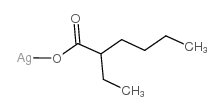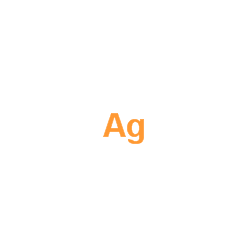26077-31-6
| 中文名 | 2-乙基己酸银 |
|---|---|
| 英文名 | silver,2-ethylhexanoate |
| 英文别名 |
silver(1+) 2-ethylhexanoate
EINECS 247-443-8 (+-)-2-Aethyl-hexansaeure,Silber-(2-aethyl-hexanoat) Silver 2-ethylhexanoate Hexanoic acid,2-ethyl-,silver(1+) salt (1:1) Hexanoic acid,2-ethyl-,silver(1+) salt (+-)-2-ethyl-hexanoic acid,silver-(2-ethyl-hexanoate) |
| 沸点 | 228ºC at 760 mmHg |
|---|---|
| 分子式 | C8H15AgO2 |
| 分子量 | 251.07200 |
| 闪点 | 116.6ºC |
| 精确质量 | 250.01200 |
| PSA | 26.30000 |
| LogP | 2.21030 |
| 外观性状 | 白色至灰白色粉末 |
| 蒸汽压 | 0.027mmHg at 25°C |
| 储存条件 | 2-8°C,避光,惰性气体保存 |
| 计算化学 | 1.疏水参数计算参考值(XlogP):无 2.氢键供体数量:0 3.氢键受体数量:2 4.可旋转化学键数量:4 5.互变异构体数量:无 6.拓扑分子极性表面积40.1 7.重原子数量:11 8.表面电荷:0 9.复杂度:93.9 10.同位素原子数量:0 11.确定原子立构中心数量:0 12.不确定原子立构中心数量:1 13.确定化学键立构中心数量:0 14.不确定化学键立构中心数量:0 15.共价键单元数量:2 |
| 更多 | 1. 性状:未确定 2. 密度(g/mL,25/4℃):未确定 3. 相对蒸汽密度(g/mL,空气=1):未确定 4. 熔点(ºC):未确定 5. 沸点(ºC,常压):未确定 6. 沸点(ºC,5.2kPa):未确定 7. 折射率:未确定 8. 闪点(ºC):未确定 9. 比旋光度(º):未确定 10. 自燃点或引燃温度(ºC):未确定 11. 蒸气压(kpa,20ºC):未确定 12. 饱和蒸气压(kPa,60ºC):未确定 13. 燃烧热(KJ/mol):未确定 14. 临界温度(ºC):未确定 15. 临界压力(KPa):未确定 16. 油水(辛醇/水)分配系数的对数值:未确定 17. 爆炸上限(%,V/V):未确定 18. 爆炸下限(%,V/V):未确定 19. 溶解性:未确定 |
|
Section 1: Product Identification Chemical Name:Silver 2-ethylhexanoate, 99% CAS Registry Number:26077-31-6 Formula:AgOOCCH(C2H5)C4H9 EINECS Number:247-443-8 Chemical Family:metal carboxylate Synonym:silver-2-ethylcaproate, 2-ethylcaproic acid, silver salt.
Section 2: Composition and Information on Ingredients IngredientCAS NumberPercentACGIH (TWA)OSHA (PEL) Title Compound26077-31-6100%no datano data Section 3: Hazards Identification Emergency Overview:Irritating to skin and eyes. May be irritating to the respiratory tract. May be harmful if swallowed. Primary Routes of Exposure:Ingestion, Inhalation Eye Contact:Causes slight to mild irritation of the eyes. Causes slight to mild irritation of the skin. Contact with the skin can lead to formation of dark blotches (silver Skin Contact: staining) Inhalation:Dust may be irritating to the nose, mucous membranes and respiratory tract. Ingestion:No information on the physiological effects of ingestion. Acute Health Affects:Irritating to skin and eyes. May be irritating to the respiratory tract. Chronic Health Affects:No information available on long-term chronic effects. NTP:No IARC:No OSHA:No SECTION 4: First Aid Measures Immediately flush the eyes with copious amounts of water for at least 10-15 minutes. A victim may need Eye Exposure: assistance in keeping their eye lids open. Get immediate medical attention. Wash the affected area with soap and water. Remove contaminated clothes if necessary. Seek medical Skin Exposure: assistance if irritation persists. Remove the victim to fresh air. Closely monitor the victim for signs of respiratory problems, such as difficulty Inhalation: in breathing, coughing, wheezing, or pain. In such cases seek immediate medical assistance. Ingestion:Seek medical attention immediately. Keep the victim calm. Give the victim water (only if conscious). SECTION 5: Fire Fighting Measures Flash Point:not applicable Autoignition Temperature:none Explosion Limits:none Extinguishing Medium:carbon dioxide, dry powder or foam If involved in a fire, fire fighters should be equipped with a NIOSH approved positive pressure self-contained Special Fire Fighting Procedures: breathing apparatus and full protective clothing. Hazardous Combustion andIf involved in a fire this material may emit toxic organic fumes. Decomposion Products: Unusual Fire or Explosion Hazards: No unusual fire or explosion hazards. SECTION 6: Accidental Release Measures Spill and Leak Procedures:Small spills can be mixed with vermiculite or sodium carbonate and swept up. SECTION 7: Handling and Storage Store in a tightly sealed non-transparent container in a dark dry place. If container is left open, salt may adsorb Handling and Storage: moisture from the atmosphere and decompose. SECTION 8: Exposure Controls and Personal Protection Eye Protection:Always wear approved safety glasses when handling a chemical substance in the laboratory. Skin Protection:Wear appropriate chemical resistant gloves and protective clothing. Ventilation:Material may form a fine dust. If possible, handle the material in an efficient fume hood. If in form of fine dust and ventilation is not available a respirator should be worn. The use of respirators Respirator: requires a Respirator Protection Program to be in compliance with 29 CFR 1910.134. Ventilation:Material may form a fine dust. If possible, handle the material in an efficient fume hood. Additional Protection:No additional protection required. SECTION 9: Physical and Chemical Properties Color and Form:white to off-white pwdr. Molecular Weight:251.08 Melting Point:no data Boiling Point:no data Vapor Pressure:not applicable Specific Gravity:no data Odor:none Solubility in Water:insoluble SECTION 10: Stability and Reactivity Stability:light sensitive solid Hazardous Polymerization:no hazardous polymerization Conditions to Avoid:exposure to light Incompatibility:Oxidizing agents Decomposition Products:Carbon dioxide, carbon monoxide, organic vapors, and metal oxides and carbonates. SECTION 11: Toxicological Information RTECS Data:No information available in the RTECS files. Carcinogenic Effects:No data available Mutagenic Effects:No data available Tetratogenic Effects:No data available SECTION 12: Ecological Information Ecological Information:Avoid release to the environment. Harmful to aquatic organisms. SECTION 13: Disposal Considerations Disposal:Dispose of according to local, state and federal regulations. SECTION 14: Transportation Shipping Name (CFR):Non-hazardous Hazard Class (CFR):NA Additional Hazard Class (CFR):NA Packaging Group (CFR):NA UN ID Number (CFR):NA Shipping Name (IATA):Non-hazardous Hazard Class (IATA):NA Additional Hazard Class (IATA):NA Packaging Group (IATA):NA UN ID Number (IATA):NA SECTION 15: Regulatory Information TSCA:Listed in the TSCA inventory. SARA (Title 313):Title compound: See Category Code N740 for reporting. Second Ingredient:none SECTION 16 - ADDITIONAL INFORMATION N/A |
| 上游产品 0 | |
|---|---|
| 下游产品 1 | |



